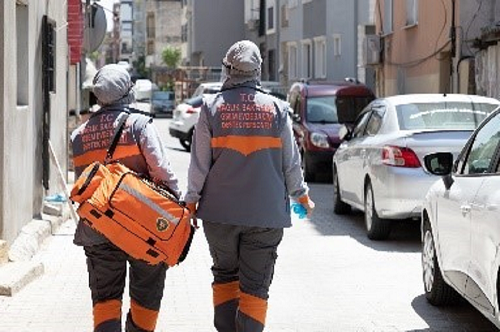Leaving no one behind: WHO spearheads health services for Syrian refugees in Turkey
More than a decade of conflict in Syria pushed more than 3.7 million Syrian refugees into Turkey. By 2016, Turkey’s health system was heavily strained. In response, a system through which refugees could access free primary health care services was developed. Syrian refugees in Turkey faced multiple challenges: language barriers when seeking care, a lack of information on their rights to healthcare services and limited knowledge of modalities of the Turkish healthcare system. Between 2017-2021, the WHO Country Office in Turkey supported the Government of Turkey in establishing the Refugee Health Programme, reaching over two million Syrian refugees through a three-dimensional approach: 1) promoting access to care, 2) training Syrian health workers to expand the workforce, and 3) enabling culturally sensitive health services in beneficiaries’ native language.

The WHO Country Office’s seven refugee health training centres provided practical training, bilingual patient guides, built on existing skills and talent, and offered a unique pathway for Syrian health professionals to enter the Turkish health workforce. The training centres came to serve as a model, providing a comprehensive service package, services which have now been adopted in other similar centres established by the Turkish Ministry of Health. As a result of WHO support, over 720 000 consultations were provided in seven refugee health training centers to refugees and migrants, two-thirds of which were women and children in seven provinces. In the two years prior to the COVID-19 pandemic, the number of consultations increased by 20% due to improvements in availability, access, and quality of consultations. The increase in consultation visits also reflected growing trust in the services provided. Over 30 000 home visits were conducted by community health workers to assist the most vulnerable (women, children, elderly, and the disabled) with basic health-related home care services annually. Support included blood pressure monitoring, blood sugar monitoring, vaccination, and delivery of health-related messages.
How did Turkey do it, and how did the WHO Secretariat support Turkey?
- Refugee health training centres established – In late 2016, the WHO Country Office provided support to renovate and equip seven refugee health training centres in seven provinces to:
- provide training for Syrian health workers;
- alleviate stress on human resources; and
- enable cultural competence in health service provision.
- Migrants strengthened Turkey’s healthcare system – The WHO Country Office training programme, developed with the Turkish Ministry of Health:
- trained over 1000 Syrian doctors, over 1000 Syrian nurses, and 81 technicians;
- developed over 1300 bilingual patient guides; and
- offered on-the-job training to over 5000 Syrian and Turkish health workers serving refugee populations to meet WHO standards of quality in care.
Syrian doctors, nurses, translators and community health service support staff were hired by the Ministry of Health to serve in a network of 180 migrant health centres, supported by the European Union under the Facility for Refugees in Turkey.

- Adaptation during COVID-19 pandemic – To prevent a standstill due to the COVID-19 pandemic, in the second half of 2020, trainings for health workers were adapted to be accessible via a WHO Country Office-developed distance-learning platform, restructured to create a user-friendly e-learning experience. In cooperation with the Ministry of Health and with funding from the European Union, the first-of-its-kind platform became operational in January 2021 and became the reference Ministry of Health/WHO Country Office training programme for health workers providing services to refugees and host communities in Turkey.
- Prioritizing mental health – Refugees have faced war, persecution, and extreme hardship. Upon migration they lose protective supports, face language and cultural challenges, among numerous other realities that can affect their mental health. To address these needs, the refugee health centres applied a holistic approach since the outset. The WHO Country Office supported 42 688 psychosocial support consultations for refugees and set up a training programme for service providers to provide quality mental health and psychosocial support services. Between 2018-2021, over 1500 Syrian and Turkish doctors completed the WHO Mental Health Gap Action Programme training, equipping them with skills to identify, diagnose, treat, and refer cases needing mental health and psychosocial support in non-specialist health settings. A 2021 impact assessment revealed improved diagnosis of mental health disorders and high patient satisfaction with mental health and psychosocial support services from the trained doctors.
- Home care consultations – 42 180 homecare consultations were provided to disabled and elderly Syrian refugees.
- Research – To increase knowledge about refugee and migrant health, and support planning, implementation and evaluation, the WHO Country Office conducted research between 2020-2021 covering areas such as mental health, pharmaceutical care, and health worker satisfaction among the Syrian refugees.
Universal health coverage means that all people have access to the health services they need, when and where they need them, without financial hardship. It includes the full range of essential health services, from health promotion to prevention, treatment, rehabilitation, and palliative care. Achieving universal health coverage for refugees requires addressing many barriers to health care utilization and strong government support, demonstrated by the Government of Turkey’s decision to ensure access to free primary healthcare services for all registered refugees.
Humanitarian crises need responses to be adaptable to changing needs. Effective cooperation between the WHO Country Office, the Ministry of Health, and other partners (European Union, KfW Development Bank, United States Department Bureau of Population, Refugees, and Migrants, Norwegian Agency for Development Cooperation, and academic institutions) was key to success.
Photo Credit: © Celik Ozuduru, WHO Country Office in Turkey
Photo Caption: Community health support staff on their way to visit beneficiaries of the Refugee Health Programme in Izmir, Turkey.
Photo Credit: © Celik Ozuduru, WHO Country Office in Turkey
Photo Caption: Care provided to a beneficiary of the Refugee Health Programme in Izmir, Turkey.
